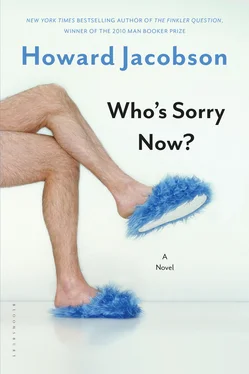From the roof terrace in Soho, on which he has no eagerness to encounter other communal souls, the spindle of the London Eye appears to be the spire of the church of St Martin’s-in-the-Field. Kreitman enjoys the prospect, out over the leaded rooftops, past the tiny attic editing suites and the neon cinemas of Leicester Square — the Odeon showing particularly well — to where the wheel turns on a needlepoint consecrated to God. Close an eye, and the golden cross of the church appears to be entangled in the spokes. In the sun, the wheel is an iridescent orb, as persuasive a covenant as a rainbow. As for distance, well, it is not exactly a handshake away, but near enough for civilities. With the use of binoculars, Kreitman can clearly make out the outlines of people in the pods, can count them, and with concentration, he believes, can even decide on the meaning of their physical dispositions, one to another.
He did not, pursuant to his glittering dinner with his daughters, confront Chas with the evidence of her double-dealing. Although incapable of taking anything lightly, Kreitman was not a man who had to get turmoil immediately off his chest. He could lie peaceably alongside a woman who had wronged him, lie folded in her arms like a vole in the embrace of a cobra, and not raise a murmur of complaint. In general this is a gift — call it a gift for quiescence — which men possess in greater abundance than women. Once wronged, most women find the physical presence of the man who has wronged them abhorrent. Fear may keep them silent, but the abhorrence remains. Perhaps because they aspire to a lesser ideal of perfection, men are better able to swallow their outrage. Kreitman was, anyway. Jealous of the very pillow on which a woman he cared for laid her cheek — a zealot of the minutiae of jealousy — he was yet able to bear it so long as the offending woman engaged him, volubly, in her wrong. Words did not have to be the medium of engagement. A look of connivance could do it. The thrum of silent confession could do it. Gross witness would, of course, do it in spades. It’s a paradox, but then what isn’t — the more access Kreitman was granted to the causes of his agony, which is another way of saying that the acuter his agony became, the easier he bore it.
It was not deception Kreitman found hard to take, it was exclusion.
He had not yet attained that peeled-back intimacy with Chas where he could assure her it would never matter what she did that was outside the letter of their law, provided she included him in it. In all probability he never would. She wasn’t pliable enough. She preferred everything to be straight. She had come a considerable distance, for her, simply being with him at all; but he couldn’t see her bending to accompany him into his spider holes and corners. What is more, he did not, in another, better part of his nature, want her to. For himself he did not want her to. Chas was meant to be a clean slate. She had told him she could not bear to be just another woman added to his total, and he had promised her he had stopped counting. He meant it. He had stopped counting off names and he had stopped counting off failures. And what that had to mean was that he had stopped counting off repetitions. Same spot, same sore, same itch. No more. Please no more.
What it came to was that there was nothing to be gained by accusing her of resuming old relations with Nyman, let alone, for all he knew, of instituting new ones, a) because she would never, in the only way that Kreitman craved, consider taking him into her confidence, and b) because he didn’t want that craving in bed with them. Either she would have to lie, or he would have to leave. If he brought her to the point of having to go on lying, he would be the more inflamed. If he left — but he couldn’t think of leaving with his mind in the state it was and his heart as pulpy as rotten fruit. Exclusion was bound to be the outcome, whatever happened. She couldn’t tell him, he didn’t want to ask her to tell him, but he needed to know.
Did he need to know?
He needed to know.
He was in a torment of needing to know and a torment of neither daring nor wanting to ask.
So he lay there, with Chas wound around him like a snake, saying nothing.
She, for her part, felt him drifting away.
‘He’s going,’ she told Dotty on the phone.
‘Another bulletin? You told me that last time. You make it sound as though he’s dying. Stop listening and get on with it,’ Dotty said.
‘I don’t know what to get on with. I think I may have hurt him when I turned him down.’
‘What do you mean you turned him down?’
‘Don’t scoff, Dotty. He asked me to marry him.’
‘Marvin Kreitman asked you to marry him?’
‘It’s not what you think. It was a gesture. Nothing but that.’
‘And your refusal? Also a gesture?’
‘I don’t know what it was. But I meant it. He asked me out of desperation. I think he was frightened he was missing his wife. I think he asked me to marry him to prove he wasn’t. Or maybe he just wanted me to say no so he could start missing me. Something like that. He’s desperate, Dotty, and I have to ask myself what I want with a desperate man.’
‘There’s no other kind, darling.’
Chas thought about that. ‘Then maybe I don’t want to be with a man at all,’ she said.
But in the meantime she tried to call him back from wherever he’d gone.
‘You’ve left me,’ she whispered one night.
‘I haven’t,’ he said.
‘You’ve stopped looking at me.’
‘Have I? I haven’t meant to stop looking at you.’
‘You’ve withdrawn everything,’ she said. ‘You’ve stopped looking at me, you’ve stopped speaking to me, you’ve stopped kissing me.’
That was the moment, wasn’t it, to challenge her with what he’d heard? It would have been a kindness. Spit it out and have done with. I know you’ve been seeing the faggot. Why did you lie? Why do you go on lying? What do you mean by it, and what do you intend to do with him now? Spit it all out — all of it, no matter how petty and inglorious — and give her the chance to clear the air. But Kreitman couldn’t breathe clear air. Like some inverted bat in a bat cave, Kreitman needed the air fetid.
‘I’m sorry,’ he said. ‘Take no notice. It’s a man thing. Change of life. I’ll be fine soon.’
Then he turned away from her so that she might hear his body and understand what it was asking for.
In the end he had to know and hang the decencies. He called Maurice up to talk to him.
Was Maurice driving Mrs Merriweather anywhere but home?
He wasn’t. Other than occasionally to the supermarket, where he helped her with her trolley.
Was Maurice perhaps party to any conversations — in the driveway of Mrs Merriweather’s house, say, or in the aisles of Marks and Spencer, or on Mrs Merriweather’s mobile phone — which were not quite in the spirit of Kreitman’s lending her his driver and his car?
He wasn’t.
Would Maurice be offended if Mr Kreitman asked him to keep his wits more than usually about him, and to mention it, should he happen to be in Richmond at an unseasonable hour and see Mrs Merriweather behaving in a way that would cause Mr Kreitman concern?
Maurice knew not to bind his employer in a man-to-man smile. He inclined his head the way a chauffeur should, even though he only chauffeured a Smart. Mrs Merriweather was a very nice woman. But then Mr Kreitman was a very nice man. And Mr Kreitman paid his wages.
I am beneath contempt, Kreitman told himself, but he was quickened in every nerve.
Quickened to no end, for many weeks, to no end at all, unless you count the fraying of the nerves of his relations with Chas, until Maurice, having kept his wits about him, drew Kreitman’s attention to Mrs Merriweather’s having taken a taxi to the London Eye, two afternoons running.
Читать дальше












